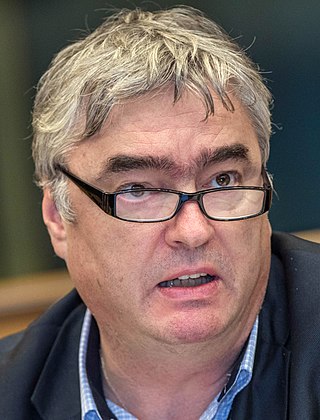
Croatia recognizes life partnerships for same-sex couples through the Life Partnership Act, making same-sex couples equal to married couples in almost all of its aspects. The Act also recognizes and defines unregistered same-sex relationships as informal life partners, thus making them equal to registered life partnerships after they have been cohabiting for a minimum of 3 years. Croatia first recognized same-sex couples in 2003 through a law on unregistered same-sex unions, which was later replaced by the Life Partnership Act. The Croatian Parliament passed the new law on 15 July 2014, taking effect in two stages. Following a 2013 referendum, the Constitution of Croatia has limited marriage to opposite-sex couples.
The Czech Republic has offered registered partnerships for same-sex couples since 1 July 2006. Registered partnerships grant several of the rights of marriage, including inheritance, the right to declare a same-sex partner as next of kin, hospital visitation rights, jail and prison visitation rights, spousal privilege, and alimony rights, but do not allow joint adoption, widow's pension, or joint property rights. The registered partnership law was passed in March 2006 and went into effect on 1 July 2006. The country also grants unregistered cohabitation status to "persons living in a common household" that gives couples inheritance and succession rights in housing.
Same-sex marriage has been legal in Slovenia since 9 July 2022 in accordance with a ruling from the Constitutional Court of Slovenia. The court ruled that the ban on same-sex marriages violated the Constitution of Slovenia and gave the Parliament six months to amend the law to align with the ruling, although the decision took effect immediately after publication. The National Assembly passed legislation to align with the court ruling on 4 October 2022, which was vetoed by the National Council one week later, but the veto was then overridden by the National Assembly on 18 October 2022.

Lesbian, gay, bisexual, and transgender (LGBT) people in Slovakia face significant challenges not experienced by non-LGBTQ residents. The status of LGBT rights in Slovakia are regarded as some of the worst among the European Union countries.

Lesbian, gay, bisexual, and transgender (LGBT) rights in Slovenia have significantly evolved over time, and are considered among the most advanced of the former communist countries. Slovenia was the first post-communist country to have legalised same-sex marriage, and anti-discrimination laws regarding sexual orientation and gender identity have existed nationwide since 2016.
Same-sex marriage has been legally recognized in Rhode Island since August 1, 2013. The state had authorized a limited form of domestic partnerships from 2002 to 2011 and the formation of civil unions from 2011 until the state began recognizing same-sex marriages in 2013. Same-sex marriage legislation passed the House of Representatives on January 24, 2013. The Senate passed an amended version on April 24, 2013 by a 26–12 vote, which the House approved on May 2 by 56 votes to 15. The bill was signed into law by Governor Lincoln Chafee the same day, and took effect on August 1, with the first same-sex marriages taking place that day. Rhode Island was the last U.S. state in New England to legalize same-sex marriage.
Slovakia does not recognise same-sex marriage or civil unions. However, there is some limited legal recognition for unregistered cohabiting same-sex couples, notably with regard to inheritance rights. The Constitution of Slovakia has limited marriage to opposite-sex couples since 2014, and bills to allow same-sex civil partnerships have been introduced several times, most recently in 2023, but all have been rejected.

The 2009 Washington Referendum 71 (R-71) legalized domestic partnership in Washington state, the first statewide referendum in the United States that extended to LGBT people the rights and responsibility of domestic partnership. The bill had passed State Legislature, and it was signed into law by the Governor in May 2009, but opponents gathered enough signatures to put the measure before the voters, who returned ballots by mail over three weeks ending on November 3, 2009, approving the measure 53% to 47%. The new law went into effect 30 days later, on December 3, 2009.

Maine Question 1 was a voter referendum conducted in Maine in the United States in 2009 that rejected a law legalizing same-sex marriage in the state. The measure passed 53–47% on November 3, 2009.

Lesbian, gay, bisexual, transgender, and queer (LGBTQ) rights in the U.S. state of Alaska have evolved significantly over the years. Since 1980, same-sex sexual conduct has been allowed, and same-sex couples can marry since October 2014. The state offers few legal protections against discrimination on the basis of sexual orientation and gender identity, leaving LGBTQ people vulnerable to discrimination in housing and public accommodations; however, the U.S. Supreme Court's ruling in Bostock v. Clayton County established that employment discrimination against LGBTQ people is illegal under federal law. In addition, four Alaskan cities, Anchorage, Juneau, Sitka and Ketchikan, representing about 46% of the state population, have passed discrimination protections for housing and public accommodations.
A referendum was held in Slovenia on 25 March 2012 on the new family code passed by the then-governing coalition led by Borut Pahor. The code was rejected with 54.55% of voters against the law.

Referendum 74 was a Washington state referendum to approve or reject the February 2012 bill that would legalize same-sex marriage in the state. On June 12, 2012, state officials announced that enough signatures in favor of the referendum had been submitted and scheduled the referendum to appear on the ballot in the November 6 general election. The law was upheld by voters in the November 6, 2012 election by a final margin of 7.4% and the result was certified on December 5.

Question 6 is a referendum that appeared on the general election ballot for the U.S. state of Maryland to allow voters to approve or reject the Civil Marriage Protection Act—a bill legalizing same-sex marriage passed by the General Assembly in 2012. The referendum was approved by 52.4% of voters on November 6, 2012, and thereafter went into effect on January 1, 2013.
Sovereignty Day is a public holiday in Slovenia, celebrated on 25 October. It commemorates one of the key events in the process of attaining independence, namely withdrawal of the last Yugoslav People's Army (JNA) soldier from the territory of present-day Slovenia. It is a designated state holiday, but not a work-free day.

The Voice for Children and Families is a right-wing Slovenian political party. The party was founded on 25 March 2017 by Aleš Primc and Metka Zevnik as an electoral arm of a movement of which they are also leaders of, the Movement for Children and Families, the initial purpose of which was to overturn a law passed by the National Assembly which would recognize same sex marriage in the Republic of Slovenia.
Same-sex marriage is currently not recognised nor performed in Bermuda, a British Overseas Territory, but it was legal between 2017 and 2022. However, marriages performed during that period remain valid.
A referendum on a law governing the Divača-Koper rail upgrade was held in Slovenia on 24 September 2017. The referendum was marked by a low turnout; a majority of voters voted in favour of the proposed law. The results were annulled by the Supreme Court in March 2018, resulting in a new referendum being held in 13 May 2018.

2019 European Parliament elections were held in Slovenia on 26 May 2019.
Toplak and Mrak v. Slovenia of 26 October 2021, is the European Court of Human Rights judgment in which the court held that voters' rights were violated when they had no legal right to ask for accessible polling places in advance to achieve accessibility before the election day. The ruling is also significant because the court for the first time extended its jurisdiction to referendums.
The recognition of same-sex unions varies by country.











